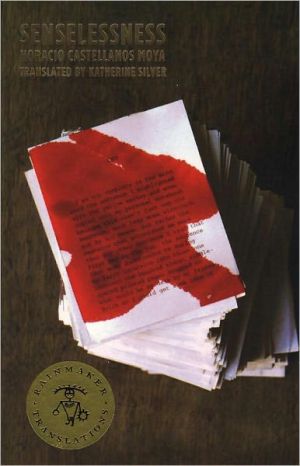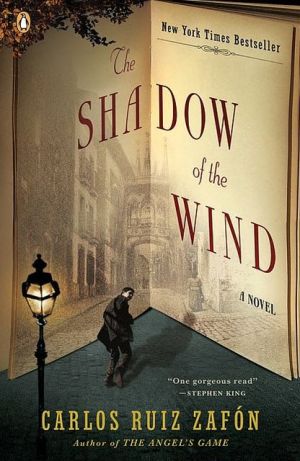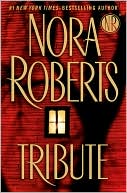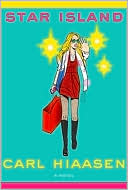Senselessness
A Rainmaker Translation Grant Winner from the Black Mountain Institute: Senselessness, acclaimed Salvadoran author Horacio Castallanos Moya's astounding debut in English, explores horror with hilarity and electrifying panache.\ A boozing, sex-obsessed writer finds himself employed by the Catholic Church (an institution he loathes) to proofread a 1,100 page report on the army's massacre and torture of thousands of indigenous villagers a decade earlier, including the testimonies of the...
Search in google:
A Rainmaker Translation Grant Winner from the Black Mountain Institute: Senselessness, acclaimed Salvadoran author Horacio Castallanos Moya's astounding debut in English, explores horror with hilarity and electrifying panache.Publishers WeeklyThe first of exiled Honduran novelist Moya's eight fictions to be translated in the U.S., this crushing satire has at its center a feisty young unnamed writer in penurious political exile from an unnamed Latin American country. It opens as he explains the daunting and dangerous freelance job he has taken in an also-unnamed neighboring state: to edit a 1,100-page report prepared for the country's Catholic archdiocese that details the current military regime's torture and murder of thousands of indigenous villagers. The writer despises the Church, but is moved and agitated by the disturbing testimonies of the survivors, at once unspeakable in their horror and unforgettable in their phrasing: "the more they killed, the higher they rose up." More or less one long rant, the book's paragraphs go on for pages as the writer gives way to paranoia, and to a sexual longing that his loneliness and powerlessness make nearly unbearable, and that he expresses profanely. It's Moya's genius to make this difficult character seem a product of the same death and disorder documented in the report, as the survivors' voices merge with his own. (May)Copyright © Reed Business Information, a division of Reed Elsevier Inc. All rights reserved.
\ Aaron Shulman - Rain Taxi“Its success hinges on the acerbically comic, darkly spitting voice of the narrator.”\ \ \ \ \ Natasha Wimmer - The Nation“He has put El Salvador on the literary map.”\ \ \ Joscha Hoffman - The Believer“Like Kafka on amphetamines.”\ \ \ \ \ Tommy Wallach - The World (PRI)“Like Kafka, Moya keeps an ironic eye trained on the way in which bureaucracies become corollaries of dictatorships….His leaps from absurdity to terror and back again are like something out of The Castle.”\ \ \ \ \ Junot Diaz - New York Magazine“I recommend Horacio Castellanos Moya’s fantastic Senselessness, in which a writer takes on the dangerous job of editing a report on military atrocities in an unnamed country. Both a descent into hell and a book about how one becomes human.”\ \ \ \ \ Tayt Harlin - Review of Contemporary Fiction“Moya's biting English-language debut…By the end of this short novel, [his] title has achieved a fully terrifying meaning.”\ \ \ \ \ Russell Banks“A brilliantly crafted moral fable, as if Kafka had gone to Latin America for his source materials.”\ \ \ \ \ Roberto Bolaño“The only writer of my generation who knows how to narrate the horror, the secret Vietnam that Latin America was for a long time.”\ \ \ \ \ Publishers WeeklyThe first of exiled Honduran novelist Moya's eight fictions to be translated in the U.S., this crushing satire has at its center a feisty young unnamed writer in penurious political exile from an unnamed Latin American country. It opens as he explains the daunting and dangerous freelance job he has taken in an also-unnamed neighboring state: to edit a 1,100-page report prepared for the country's Catholic archdiocese that details the current military regime's torture and murder of thousands of indigenous villagers. The writer despises the Church, but is moved and agitated by the disturbing testimonies of the survivors, at once unspeakable in their horror and unforgettable in their phrasing: "the more they killed, the higher they rose up." More or less one long rant, the book's paragraphs go on for pages as the writer gives way to paranoia, and to a sexual longing that his loneliness and powerlessness make nearly unbearable, and that he expresses profanely. It's Moya's genius to make this difficult character seem a product of the same death and disorder documented in the report, as the survivors' voices merge with his own. (May)\ Copyright © Reed Business Information, a division of Reed Elsevier Inc. All rights reserved.\ \ \ \ \ Library JournalThis quirky seventh novel by Castellanos Moya, a member of Central America's younger generation of writers, is his first translated into English. The nameless narrator is lured from his native El Salvador to an unnamed neighboring country (ostensibly Guatemala, but it could pass for anywhere) to copyedit for the Catholic Church an 1100-page report detailing the atrocities committed by the army against guerrillas and their indigenous sympathizers. As he becomes more and more involved with the report, he assimilates its shocking testimonies, as phrases from the text, such as the opening line-"I am not complete in the mind"-haunt and torment him. Compulsive and paranoid, he imagines dire events are happening to him when reality indicates otherwise. In one instance, he hides so as not to be spotted by some questionable types he thinks are plotting against him; he panics when he feels hot breath on his neck, thinking that the perpetrators are out to get him only to find out that it's the panting of a mastiff puppy. The report's grimness is offset by the humor in the narrator's life, as when an amorous episode is aborted when the protagonist takes a whiff of his lover's smelly feet. The narrator eventually escapes this nightmare by fleeing to Germany-or so we are led to believe. Recommended where Latin American literature is popular.\ —Lawrence Olszewski\ \ \








